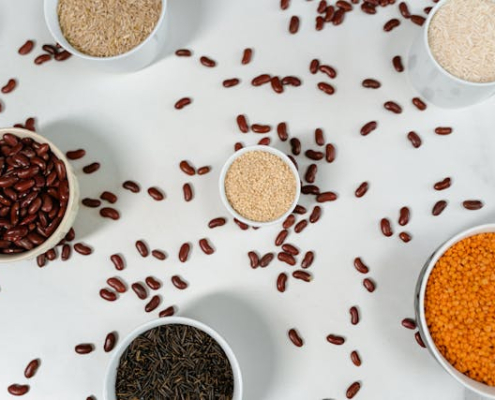6 ways to reduce bloating and improve digestion naturally – Part 1
Here’s an interesting fact, digestion actually starts in the brain, not in your mouth. And once you do start eating, it takes anywhere from 24 to 72 hours for the food to move through your digestive tract. How long it actually takes depends on the food (fat and protein take longer than carbohydrates to be broken down), amount and the state of your digestive tract.
There are several different enzymes involved in the process of digestion, and their secretion is regulated by the brain, stomach, liver and intestines. It may seem that we don’t have much influence on the whole process, but actually we do. There are several things we can consider and focus on to improve our digestive capability.

1. Chew, chew and chew
It may sound strange, but people don’t tend to chew their food properly or for long enough. Chewing is needed to trigger the brain into producing saliva, which contains enzymes necessary to breakdown food. When we don’t chew properly, big pieces of food end up in the stomach and small intestines. The bigger the pieces of unchewed undigested food entering your gut, the higher the chance of it being fermented by your microbiome (the organisms such as bacteria and yeast that live in your gut). This is not such good news as it may lead to fermentation and bloating if the microbiome is not balanced. Improper chewing may also lead to the body not absorbing enough nutrients from the food.
What to do: Chew about 30 times if possible, or until the food in your month doesn’t resemble what was on your plate.
2. Relax (aka don’t eat when you are angry)
When you are angry, stressed or worried, your brain activates that part of the nervous system responsible for the primitive response to danger called “fight or flight” response. This is our inbuilt survival mechanism that allowed us to survive in times of sudden danger or stressful situation (e.g. being attacked by a predator).
However, our brain doesn’t distinguish between sudden danger and chronic stressful situations such as being stuck in traffic, or money worries. Our brain sees it all as danger and responds respectively.
Unfortunately for us, when the brain switches on the “fight or flight” response, it supresses the digestive process as it doesn’t deem it crucial to your survival in that moment. The energy is diverted to your muscles and heart getting you ready fight or flight situation. Therefore, chronically stressed people often suffer with digestive problems such as acid reflux, constipation or bloating.
What to do: Take a moment before starting to eat and take a few deep breaths. Think about something positive or funny. Just as negative thinking can turn on the “fight or flight” response, positive thinking can turn the “rest and digest” part of the nervous system, allowing for better digestion.
3. Be mindful
Paying attention to the food in front of you will help you improve the digestive process. Digestion begins in the brain when we see and smell food before we even start eating. So, paying attention to what’s in front of you on your plate, the colour, the smell, the taste, chewing each bite carefully, enjoying each mouthful will improve the release of digestive enzymes allowing for better digestion.
That’s one of the reasons why it’s important to sit at the table and not slouching on the sofa watching TV or looking at your phone during meal times. By having this mindful eating practice it’ll allow you to be more in sync with your body and notice when you are full. When you eat and watch TV or are distracted by your phone, you’re more likely to overeat and not chew properly.
What to do: Introduce a “no phone policy” at the table, or have set regular meal times with the TV switched off.
These are just some general tips but remember what works for one person, may not work for someone else. If in any doubt, please get in touch and I’ll be happy to have a chat with you.
Let me know in comments below what has helped you to improve your digestion.








 Anna Pinnock Nutrition
Anna Pinnock Nutrition
Leave a Reply
Want to join the discussion?Feel free to contribute!